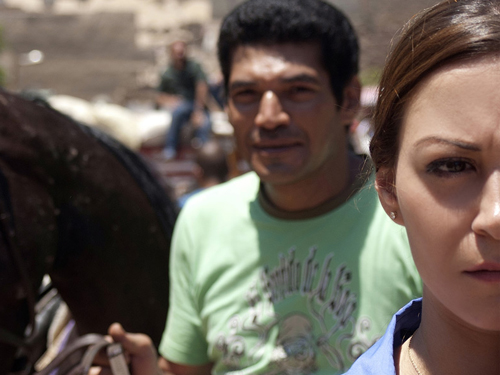
Screened at the Luxor African Film Festival last weekend, the Kenyan film “Soul Boy” is a seminal production in African cinema of the past few years.
“Soul Boy” is the third film by the young Ghanaian-Kenyan filmmaker Hawa Essuman, who worked for years making commercials, documentaries and dramas for Kenyan television.
The film focuses on Abila (Samson Odhiambo), a 14-year-old boy living with his parents in Kibera, one of the largest slums in East Africa. He wakes up one morning from a terrifying nightmare, in which he is sleeping on railroad tracks as a speeding train approaches, to find that his father (Joab Ogolla) has fallen sick and the family’s grocery shop has been seized as collateral.
Abila is both terrified and confused. When he asks his father about his illness, the father replies that someone has stolen his soul.
Abila, along with his friend Shiku (Leila Dayan Opou), try to save his father, who they discover has gambled his soul away. They find the town’s fortuneteller, who tells Abila that he must complete seven tasks in a single day, or else his father would lose his soul forever.
The popular legend
Folk tales run strongly through “Soul Boy,” from Abila’s dream to his father’s gambling and resulting illness, and the hoof-like leg of the fortuneteller, who guides Abila through the rest of the film, telling him to follow the movement of the sun for hints on how to save his father.
The father-son relationship in “Soul Boy” seems to be symbolic of the local community, with the father representing society and Abila as the younger generation of Africans.
Essuman takes us deep into African culture, famous for sorcery, magic and myth. But, she and screenwriter Billy Kahora manage to skillfully weave popular myth with the socio-economic realities of Abila’s hometown through the seven tasks that Abila must fulfill, which are purely social challenges rather than mythical ones.
The first task, for instance, is to overcome his shyness, which he does by taking part in a social parody, when an actor asks him to come on stage. For the second task, the fortuneteller asks him to save someone who committed a sin, without judging him. So, Abila hides a young thief from a crowd chasing him for stealing a phone. He then finds out that the young boy leads a very harsh life, and lets him go after his pursuers leave.
The most significant of these tasks leads Abila to hide behind his aunt’s hanging cloak. He finds a sign of the sun stitched onto it, and follows it like the fortuneteller instructed him, leading him out of town to where his aunt works in a white businessman’s mansion.
Is the solution in white hands?
When Abila’s aunt finds out that he’s been following her, she takes him along to her employer’s mansion, an important businessman, who leads a miserable life with his family, with whom he does not care to spend time with.
Essuman seems to draw some parallels between the rich white businessman and Abila’s poor father, since both end up leading soulless lives, albeit for different reasons.
Waiting for the sign that leads him to the next task, Abila finds himself saving the businessman’s daughter who chokes on food. The father rewards him with enough money to save the family’s grocery shop.
Although “Soul Boy” seems to suggest social cohesion and coexistence in Kenya, the proposed solution for existing tensions between the natives and the white community — the money offered by the rich white businessman in return for black Abila saving his daughter’s life — seems simplistic.
Man as legend
Abila ends up completing the seven tasks, including sleeping on the railroad tracks of his dream. The fortuneteller had told him that to save his father, he needs to discover a “new place.” Abila believing in himself and overcoming his fears is the true purpose of the film.
The legend in “Soul Boy” does not lie in saving the gambled-away soul, or the various challenges Abila faces, but instead in acquiring the self-confidence to change ones reality and developing the compassion to help others unconditionally. This is what ends up saving the soul of Abila’s father.
Essuman effectively translated Kahora’s screenplay into “Soul Boy.” Using a handheld camera throughout the film, shot in a documentary style, she followed Abila on his journey through the city’s clustered alleys, painting a sincere picture of the poor neighborhood, and contrasting it with the lavish lifestyle of the businessman, reflecting the hardships Kenyans continue to suffer after decades of colonialism.




